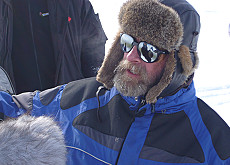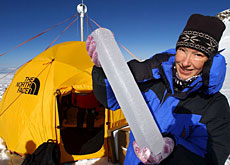Iceman keeps his cool despite global warming

For the past 33 years Swiss scientist Konrad Steffen has been a regular visitor to the two poles, studying the consequences of climate change on the ice cover.
swissinfo caught up with him at the Swiss Camp on Greenland’s west coast, where he measures variations in the island’s ice cap with his research team from Colorado’s Cooperative Institute for Research in Environmental Sciences (CIRES).
“Koni”, as Steffen is known, is a true lover of nature, especially the cold and the snow. Since 1975, the phlegmatic Zurich-born scientist, who is of mixed Swiss-Swedish parentage, has travelled every year to the North and South poles to carry out research.
“What I love about the Arctic is the incredible space. For one month it becomes our laboratory where we take measurements and modify our instruments, before we head home. For the rest of the year the figures are sent to us by satellite,” he explains.
Steffen likes to be out in the field, whether it’s on the Antarctic ice sheets, up Mount Kilimanjaro or following projects in China. He spends every second week away from his family who live in Boulder.
His colleagues like to describe him as a force of nature, at ease in conditions that would make others suffer.
“He’s a camel. He can go a whole day without eating or drinking, while you’re supposed to consume twice as much as normal when you work here in the Arctic,” says Jay Zwally, a researcher who has long worked with the Swiss scientist.
Electronics to geosciences
Since 2005, he has also been the head of CIRES at the University of Colorado – one of the biggest research institutes in the United States with 610 staff members – which brings together geophysicists, engineers and climatologists from different institutions.
Nowadays he works mainly as an engineer. This August in Greenland he will test his “new baby”, equipped with lasers and rotating cameras, studying cracks in the ice that allow water to trickle down to the bottom of the polar ice caps.
“When I was a student at the Federal Institute of Technology in Zurich I met a professor who was carrying out research in the Arctic,” he explains. “It really fascinated me so I decided to change from studying electronics to geosciences.”
Later on, when teaching at the federal institute, Koni had another important meeting, when he got to know a teacher from Boulder University who suggested he spend a year in Colorado.
Steffen actually stayed for two years, supported by Nasa, the US government’s space agency, for whom he carried out satellite measurements. Then two years after returning to Switzerland, Boulder University called him up with the offer of a specially created post, which was “impossible to refuse”.
Climate change
Since then he has lived the Swiss expatriate lifestyle – continuing to perfect his fondue cooking while working as a scientist with a deep concern for the environment.
“It’s worrying to know that Greenland holds all this fresh water and that the climate, although variable, has continued to heat up over the past five to ten years. How much longer do we have before all this ice melts into the ocean?”
The problem with water, he likes to point out, is that we have enough but not in the right places.
Climate change is expected to influence sea levels around the world – rising by up to seven metres if Greenland melts completely –and affecting densely populated areas. Higher temperatures will also lead to droughts and famines in many regions.
“We have to work on all parameters at the same time,” said Koni. “Hundreds of millions of people will have to move and we know how badly we are at dealing with population movements.”
But in the face of a shifting climate, the Swiss researcher is sure that all is not lost.
“We know how to save energy. Machines and cars can be made more efficient,” he reckons.
For Steffen, it is high time that society starts thinking about alternative energies that make a difference.
“Investing in clean energies exported to developing countries – in particular China – would have a considerable impact,” he told swissinfo. “In my opinion, if we develop good projects we can reduce greenhouse gas emissions while maintaining our standard of living.”
swissinfo, based on a French article by Pierre-François Besson in Greenland
Although Switzerland does not have a national polar research centre, it is able to study the Arctic and Antarctic regions via research carried out by Bern University, the Federal Institute of Technology in Zurich and Geneva University.
The International Polar Year is a large scientific programme focused on the Arctic and the Antarctic from March 2007 to March 2009.
It will involve over 200 projects, with thousands of scientists from over 60 nations examining a wide range of physical, biological and social research topics.
The Swiss Camp in Greenland was set up by Konrad Steffen and his colleagues from the Federal Institute of Technology in Zurich in 1990.
The nearest settlement, Ilulissat, is 70km away. At 1,100m above sea level on top of the ice cap, the camp is on the edge of the line marked by winter snowdrift and summer snow.
Recent data obtained at the site confirm the rise of temperatures and the accelerated movements of the ice sheets.
Using instruments at the camp, Steffen has been able to prove a 30 per cent increase in areas where snow is melting in Greenland.

In compliance with the JTI standards
More: SWI swissinfo.ch certified by the Journalism Trust Initiative












You can find an overview of ongoing debates with our journalists here . Please join us!
If you want to start a conversation about a topic raised in this article or want to report factual errors, email us at english@swissinfo.ch.